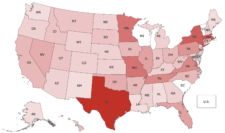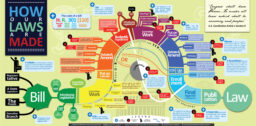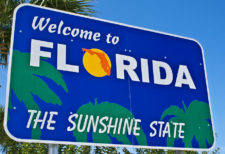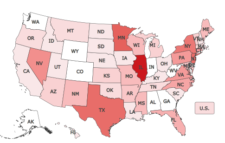 About a dozen press associations received a bit of a surprise last week when one of the two major vendors of statewide public-notice websites announced it was “sunsetting” that part of its business. In the release announcing its decision, Column said it was making the change to focus on its public notice platform for publishers, which it says “has grown considerably … (o)ver the past year.”
About a dozen press associations received a bit of a surprise last week when one of the two major vendors of statewide public-notice websites announced it was “sunsetting” that part of its business. In the release announcing its decision, Column said it was making the change to focus on its public notice platform for publishers, which it says “has grown considerably … (o)ver the past year.”
Column is giving its press-association clients plenty of time to migrate to a new service; they have until May 31, 2024, to find a new vendor. The company recommended that its clients transition to the other major statewide public-notice website vendor — the Illinois Press Association — which Column called “the best alternative provider of public notice website hosting.”
Several eligibility and self-storage bills advance
 It’s the time of year when many states have either ended their legislative sessions or are preparing to adjourn sine die in the next month or so. We’ve also passed the point in most states when new bills can be introduced or existing legislation that hasn’t passed out of the body in which it was introduced can be considered in the opposite chamber.
It’s the time of year when many states have either ended their legislative sessions or are preparing to adjourn sine die in the next month or so. We’ve also passed the point in most states when new bills can be introduced or existing legislation that hasn’t passed out of the body in which it was introduced can be considered in the opposite chamber.
Nevertheless, several noteworthy public notice-related bills we’ve been following did see some movement last month.
Most importantly, bills in Arizona and Iowa authorizing local governments to publish notices on government websites instead of newspapers were significantly amended before they passed their original chambers.
About those Disney notices …
 You may have heard that the Walt Disney Co. recently took steps to frustrate Florida Gov. Ron DeSantis’ attempt to strip the entertainment conglomerate of its power to appoint members of the board that provides oversight for Disney World.
You may have heard that the Walt Disney Co. recently took steps to frustrate Florida Gov. Ron DeSantis’ attempt to strip the entertainment conglomerate of its power to appoint members of the board that provides oversight for Disney World.
According to a story published last week in the New York Times, the Disney-appointed Reedy Creek Improvement District (RCID) Board of Supervisors “quietly pushed through a development agreement” preventing the governor from replacing them with his allies, thereby maintaining Disney’s governance of the world’s largest theme park. The Board proposed the agreement at a public meeting on Jan. 25 and approved it at a follow-up meeting on Feb. 8.
What happens after the bill passes?
 For over 20 years, newspapers and their state press associations turned back every bill that authorized government units to issue public notice via their own websites instead of local newspapers. That winning streak ended last year when the Florida legislature gave state agencies and local governments the option to post notices on county websites.
For over 20 years, newspapers and their state press associations turned back every bill that authorized government units to issue public notice via their own websites instead of local newspapers. That winning streak ended last year when the Florida legislature gave state agencies and local governments the option to post notices on county websites.
The new law, which took effect on Jan. 1, has one upside. It set in motion a vast experiment that will tell us what local governments do when given this choice. Five weeks into the new year an answer is beginning to emerge: It depends primarily on the motivations of local elected officials and the actions local newspapers take in response to the challenge.
Newspaper notice still going strong
 Here’s a USC Annenberg Center on Communication Leadership & Policy study from 2010, entitled “Insult to injury: The disappearance of public notices in US newspapers”.
Here’s a USC Annenberg Center on Communication Leadership & Policy study from 2010, entitled “Insult to injury: The disappearance of public notices in US newspapers”.
The final paragraph of the report includes the following claim: “This brief in no way advocates for the demise of public notices, yet in an era of cost cutting and online information distribution newspapers are increasingly facing a reality of online-only public notices.”
Scope of Florida’s new public notice law questioned
 As we previously reported, the new Florida public notice statute set to take affect on Jan. 1 is beset with ambiguity. In general, the statute is designed to give local governments the option to publish notices on their county website in lieu of newspapers. But as the dust has settled from the battle over House Bill 7049, fears about the immediate damage it will wreak on public notice in the state have diminished.
As we previously reported, the new Florida public notice statute set to take affect on Jan. 1 is beset with ambiguity. In general, the statute is designed to give local governments the option to publish notices on their county website in lieu of newspapers. But as the dust has settled from the battle over House Bill 7049, fears about the immediate damage it will wreak on public notice in the state have diminished.
Making lemonade out of lemons in Florida
 We have long feared the day the first state in the U.S. passes a law authorizing the government to post all or most public notice on government websites in lieu of newspapers. That day happened last month when the Florida House and Senate both voted largely along party lines to approve House Bill 7049.
We have long feared the day the first state in the U.S. passes a law authorizing the government to post all or most public notice on government websites in lieu of newspapers. That day happened last month when the Florida House and Senate both voted largely along party lines to approve House Bill 7049.
Gov. Ron DeSantis is widely expected to sign the bill when it reaches his desk. The bill takes effect on Jan. 1, 2023.
[See a description of the key features of HB-7049 below this story.]
Ill-considered Florida bill on the move
 Good news: By March 1, 2021, bills had been introduced in 20 states that would have moved all public notice, or a significant percentage of it, from newspapers to government websites. A year later we’ve seen similar legislation in only six states.
Good news: By March 1, 2021, bills had been introduced in 20 states that would have moved all public notice, or a significant percentage of it, from newspapers to government websites. A year later we’ve seen similar legislation in only six states.
Bad news: The bill in one of those states — Florida House Bill 7049 — is a serious threat to become law. HB-7049 passed out of committee last Monday and is expected to be approved by the full House sometime this week.
So the battle over public notice in Florida comes down to the Senate, as it has in the past.
Public notice in Florida in peril once again
 Our original headline for this story was “Newspaper notice off to good start in 2022.” But late last night we learned that Florida — a state that last year passed a progressive bill paving the way for the eventual migration of statutory notice to newspaper websites — was in play once again.
Our original headline for this story was “Newspaper notice off to good start in 2022.” But late last night we learned that Florida — a state that last year passed a progressive bill paving the way for the eventual migration of statutory notice to newspaper websites — was in play once again.
We haven’t had time to digest the 40-page bill, but it’s clearly designed to undo the work that went into last year’s historic legislation by moving public notice to government websites. The committee bill passed out of the Judiciary Committee this morning with GOP backing on a straight party-line vote.
Year-in-Review: The five best new public notice laws of 2021
 We began 2021 with a sense of dread. We feared it might be the year the first state legislature moved public notice from newspapers to government websites.
We began 2021 with a sense of dread. We feared it might be the year the first state legislature moved public notice from newspapers to government websites.
But that didn’t happen.
With only a handful of state legislatures still in session and little chance any of them will pass significant public notice legislation by the end of the year, newspaper notice is still alive and mostly well in every state.
